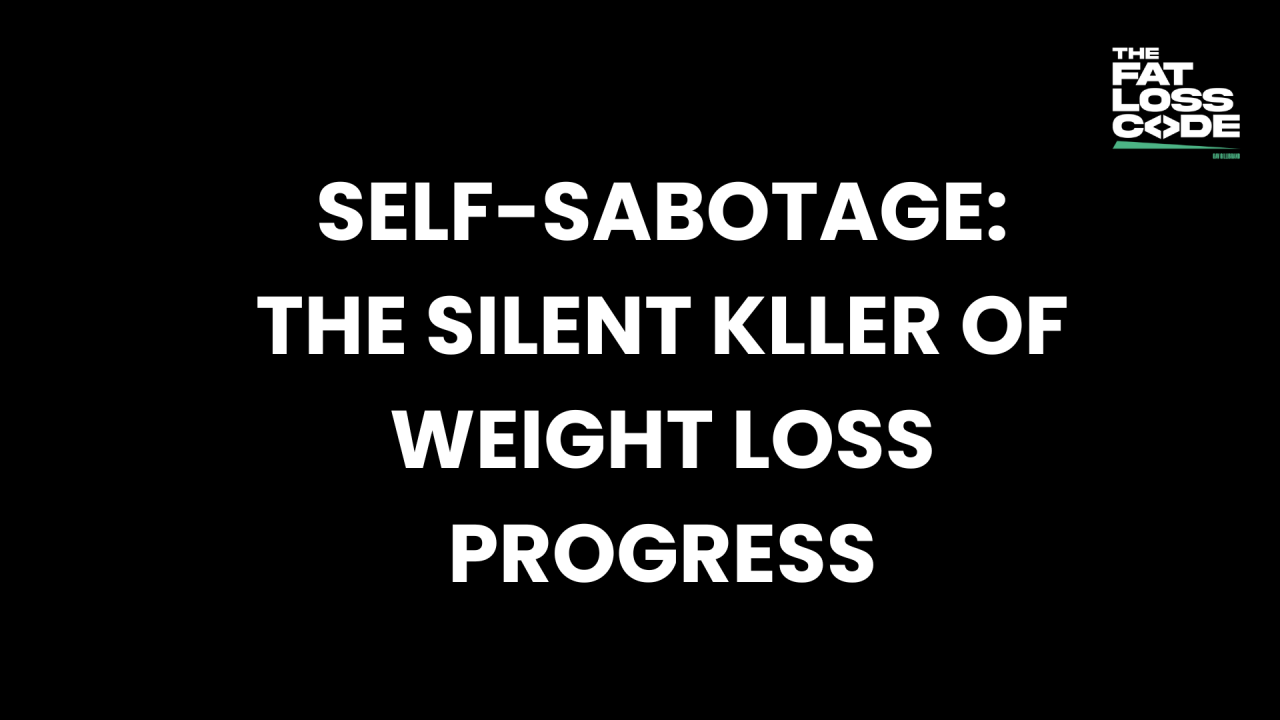Self-sabotage in weight loss is a complex and multifaceted psychological issue that often goes unaddressed despite being one of the most significant barriers to success. It manifests in subtle and overt ways, derailing individuals from their goals and perpetuating cycles of frustration, guilt, and hopelessness.
At its core, self-sabotage is a behaviour driven by unconscious fears, unresolved emotions, and deep-rooted beliefs about the self, often operating in stark contrast to a person’s conscious desire to achieve a healthier lifestyle. To fully understand this phenomenon, it is essential to delve into the psychological underpinnings that fuel it, such as the self-fulfilling prophecy, self-limiting beliefs, issues surrounding confidence and self-esteem, and the myriad emotional struggles that emerge in the weight loss journey.
One of the most insidious aspects of self-sabotage is the role of the self-fulfilling prophecy. This psychological concept suggests that individuals’ expectations about themselves often influence their behaviour in such a way that these expectations become reality. When applied to weight loss, this means that those who believe they will fail are more likely to engage in behaviours that ensure they do.
For instance, someone who has internalised the belief that they are incapable of sticking to a diet may unconsciously create situations where failure becomes inevitable. This might involve skipping meal prep, keeping tempting foods within easy reach, or binge eating after a minor dietary slip-up. When the inevitable setback occurs, it reinforces the initial belief, further entrenching a sense of futility. Breaking this cycle requires a profound shift in mindset, which is easier said than done, as negative expectations are often deeply ingrained through years of societal messaging, personal experiences, and familial influences.
Closely linked to the self-fulfilling prophecy are self-limiting beliefs, which act as invisible barriers to success. These beliefs often stem from past failures or societal narratives that define certain body types or eating behaviours as unchangeable.
A person might tell themselves,
“I’ve always been overweight, so there’s no point in trying,” or “My genetics will never let me be thin.”
Such thoughts become mental shackles, preventing individuals from even attempting to adopt healthier habits. These beliefs frequently develop as protective mechanisms against the pain of disappointment. By convincing themselves that change is impossible, individuals avoid the crushing blow of trying and failing. However, this protective strategy ultimately keeps them trapped in a cycle of self-sabotage, where potential success is never even pursued. To overcome these beliefs, individuals must challenge their validity, often requiring cognitive reframing and a willingness to confront uncomfortable truths about their own agency and potential.
Confidence and self-esteem are also pivotal factors in the psychological landscape of weight loss. Many individuals embarking on a weight loss journey struggle with a fragile sense of self-worth, often due to years of societal judgement and internalised body shame. This lack of confidence can undermine efforts before they even begin. When someone believes they are unworthy of self-care or undeserving of success, they are less likely to prioritise healthy habits or persist through challenges.
Often, weight loss itself can paradoxically exacerbate issues with self-esteem. As individuals shed pounds, they may confront a new set of insecurities, such as loose skin, lingering body dysmorphia, or the pressure to maintain their progress. These unexpected psychological hurdles can lead to feelings of overwhelm, prompting self-sabotaging behaviours as a way to retreat from the discomfort of change. Building confidence and self-esteem requires a holistic approach that goes beyond the number on the scale, focusing instead on self-acceptance, body neutrality, and the recognition of one’s intrinsic worth.
Emotional eating is another significant manifestation of self-sabotage in weight loss. Food often becomes a coping mechanism for dealing with stress, loneliness, boredom, or unresolved trauma. The temporary comfort provided by eating can create a vicious cycle where negative emotions trigger overeating, which then leads to guilt and further negative emotions. This cycle is particularly difficult to break because it operates on both a psychological and physiological level, as certain foods trigger dopamine release in the brain, reinforcing the behaviour. To overcome emotional eating, individuals must develop healthier coping mechanisms and learn to identify and process their emotions without turning to food. This often requires therapy or structured support, as many people are unaware of the emotional triggers driving their eating habits.
One of the more subtle ways self-sabotage manifests is through perfectionism. Many individuals set unrealistic expectations for their weight loss journey, believing that they must adhere to a rigid plan without deviation. When inevitable setbacks occur, such as indulging in a favourite treat or missing a workout, perfectionists often spiral into a pattern of all-or-nothing thinking. A single perceived failure becomes justification for abandoning their efforts altogether. This black-and-white mindset is a breeding ground for self-sabotage, as it leaves no room for flexibility, self-compassion, or the understanding that progress is rarely linear. Shifting from a perfectionist mindset to one focused on progress and sustainability requires a fundamental change in how individuals define success, recognising that consistency, not perfection, is the key to long-term results.
The social dimension of weight loss also plays a significant role in self-sabotage. Many individuals face external pressures and mixed messages from friends, family, and society at large. On the one hand, there is immense pressure to conform to societal ideals of thinness; on the other, social gatherings often revolve around food and indulgence. Navigating these conflicting messages can be exhausting, leading individuals to sabotage their efforts either by isolating themselves to avoid temptation or by giving in to social pressures and then feeling guilty afterwards. Moreover, loved ones can sometimes unconsciously undermine weight loss efforts, either out of jealousy, fear of change, or misguided attempts to be supportive. Addressing these social dynamics requires clear communication, boundary setting, and a strong sense of self-awareness.
Another psychological barrier to weight loss is the fear of success. While it may seem counterintuitive, many individuals are deeply uncomfortable with the idea of achieving their weight loss goals. Success often brings with it a host of new challenges, such as increased attention from others, changes in social dynamics, and the pressure to maintain the new body. For some, weight has served as a form of protection, insulating them from unwanted attention or difficult emotions. The prospect of losing that protective barrier can be frightening, leading to self-sabotaging behaviours that ensure they remain in their comfort zone. Overcoming this fear requires a deep exploration of one’s relationship with their body and a redefinition of what success truly means.
The role of identity in self-sabotage cannot be overlooked. Many individuals struggling with their weight have internalised an identity as “the overweight person” or “the one who can’t stick to a diet.” This identity becomes a core part of how they see themselves, and any attempt to change threatens that sense of self. Even when weight loss efforts are successful, individuals may find themselves engaging in self-sabotage as a way to return to the familiar identity they are comfortable with. Breaking free from this identity requires a process of self-reinvention, where individuals redefine who they are beyond their weight or eating habits.
Finally, it is essential to acknowledge the role of trauma in self-sabotage. For many individuals, weight gain and eating behaviours are coping mechanisms developed in response to past traumas, such as abuse, neglect, or bullying. These traumas create deep-seated emotional wounds that manifest in patterns of self-sabotage. Weight loss can trigger these unresolved traumas, as the body changes and old memories resurface. Addressing trauma is a delicate and often lengthy process that requires professional support. It involves not only healing the past but also developing new, healthier ways of coping with emotional pain.
“In conclusion, self-sabotage in weight loss is a deeply rooted psychological issue influenced by a multitude of factors, including the self-fulfilling prophecy, self-limiting beliefs, confidence and self-esteem issues, emotional struggles, social pressures, fear of success, identity conflicts, and trauma”
Overcoming self-sabotage requires more than willpower or discipline; it demands a comprehensive and compassionate approach that addresses the underlying psychological barriers to success. By challenging negative beliefs, building self-worth, developing healthier coping mechanisms, and seeking support when needed, individuals can break free from the cycle of self-sabotage and achieve sustainable, meaningful change.
Weight loss is not just a physical journey but a profound psychological transformation that requires patience, self-awareness, and a commitment to healing both the body and the mind.
My name is Gav Gillibrand and I help busy & high performing men lose 20-60lbs in 3-6 months & keep it off for life. Burn fat, build muscle & skyrocket energy. 750+ men transformed and counting…
Here’s how I can help you:
2. Book a FREE 15min Body Transformation Strategy Call with me – pure value, no strings, just answers about your health & fitness.







